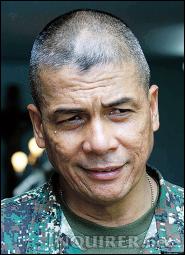
A retired military officer who led the creation of the first Marines Reconnaissance (Recon) Battalion in 1995 disputed statements by a fellow retired officer that Marines on test mission are not supposed to engage in battle.
“The mission of Force Recon Battalion is special operations. We do the difficult work in the Armed Forces. Recon is just one of the aspects of our mission and capabilities. So when you say they are not supposed to engage with the enemy is not correct,” retired Major General Natalio Ecarma III told INQUIRER.net on Tuesday.
The highly decorated retired Marine general, who also underwent specialized trainings under the Army’s elite units -the Special Forces and Scout Rangers, as well as US Scout Ranger and US Marines Recon courses – led the formulation of the Marines Recon training course.
Ecarma was then a junior officer in 1995 when he was tasked to create the Force Recon Battalion, which included the formulation of the training course for the special operations unit.
“The doctrine used in our Marine Recon was based on the concept of our special operations, and the test mission was organized from the Army’s Scout Rangers which we integrated there,” he said.
He said the Recon is the Marines counterpart of Army’s elite units Special Forces and Scout Rangers, which demands the “highest standard of soldiery.”
Retired Marine Colonel Ariel Querubin earlier said that Marines on test mission should not engage in battle, and is only limited to gathering data.
Ecarma is Querubin’s junior at the Philippine Military Academy, where they both attended. The former is from PMA Class 1981, while the latter is from PMA Class 1979.
But Ecarma said students undergoing specialized courses are sent on a test mission “in order to confirm whether they learned or not.”
A Marines Recon course usually lasts for about six months, and a test mission is conducted on the final months. The test mission is part of the training and the students will not finish the course unless they are engaged in an actual encounter.
If you follow the procedures, then there are minimized casualties, Ecarma said.
He added that he sees no need to review the doctrine of the Marines Recon training course, but rather the implementation of the procedures must be examined.
“I believe the doctrine is correct, the concept is sound but the problem is the implementation on the ground,” Ecarma said, but clarified that he was not referring to the Sulu incident, as the investigation is still ongoing.
The Sulu encounter over the weekend left six soldiers dead, including a junior officer Second Lieutenant Alfredo Lorin VI, in a clash with the Abu Sayyaf group. The other fatalities were Privates First Class and a Sergeant. They were part of the Force Recon Class 18 as stated on a report by the Western Mindanao Command.
The soldiers were tasked to rescue kidnap victim Casilda Villarasa, wife of Sergeant Faustino Villarasa.
“Karamihan sa Recon dapat bata..Sa hirap ng mission, tsaka yung tinatawag ng operational tempo. Ang kelangan dyan malalakas..matitigas,” Ecarma said when asked whether he found the fatalities too young to die in battle.
(Recon is composed mostly of young Marines because of its arduous mission and operational tempo. Strong and tough men are needed here.)
“Age is not actually an advantage when physical fitness is concerned…..young fighters constitute Recon,” he said.
Ecarma said that Marine operations are usually successful, but they only get public exposure when they incur casualties.
“The Recon has many successful missions that are not known to public, but when we get casualties that’s when we get exposure,” he said.
He cited the military’s victory over Abu Sayyaf chieftain Khadaffy Janjalani as one of its high-profile successes.
Meanwhile, Defense Secretary Voltaire Gazmin also defended the deployment of Marines’ Recon students in Sulu on a test mission, saying it was part of their test in the special operations course.
“Before a student graduates from the course, they undergo a test mission to confirm if they have learned anything or not. It is during an encounter when it is verified if they learned something. Sometimes we incur casualty, sometimes we emerge as very victorious without any casualty,” he told in a radio interview.
http://newsinfo.inquirer.net/416621/retired-general-disputes-querubin-over-test-mission-controversy

No comments:
Post a Comment
Note: Only a member of this blog may post a comment.